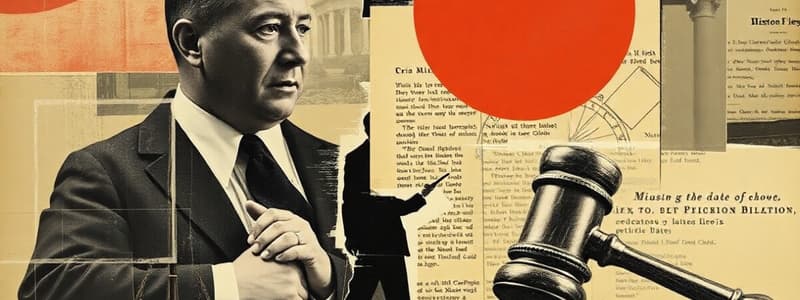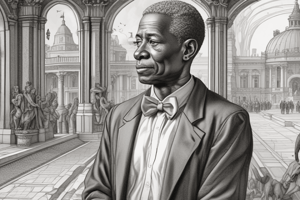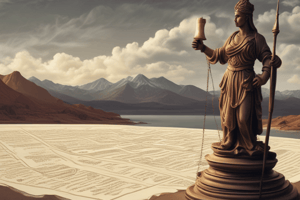Podcast
Questions and Answers
What does Section 72 of the Penal Code prohibit?
What does Section 72 of the Penal Code prohibit?
- Any agreement that influences a public officer's vote for benefits (correct)
- Agreements for non-political benefits by public officers
- Influencing public officers solely for the public good
- Only monetary agreements in exchange for political favors
In the case of McDonnell v. United States, which action was deemed not an 'official act'?
In the case of McDonnell v. United States, which action was deemed not an 'official act'?
- Providing formal governmental decisions
- Hosting promotional events for companies
- Encouraging state research on products
- Conducting routine political activities (correct)
What is a characteristic of purposivist approaches to statutory interpretation?
What is a characteristic of purposivist approaches to statutory interpretation?
- They consider the legislative intent behind a law. (correct)
- They ignore the legislative process entirely.
- They strictly adhere to procedural rules without questioning the purpose.
- They focus solely on the literal language of the statute.
Which of the following does NOT fall under the definition of corruption as per the case discussed?
Which of the following does NOT fall under the definition of corruption as per the case discussed?
How do purposivists view the role of judges in relation to statutes?
How do purposivists view the role of judges in relation to statutes?
What can be inferred about everyday political activities regarding federal bribery laws?
What can be inferred about everyday political activities regarding federal bribery laws?
What is a significant issue in understanding statutes according to the historical background?
What is a significant issue in understanding statutes according to the historical background?
Which principle does NOT apply to the interpretation of public officer agreements based on the discussed cases?
Which principle does NOT apply to the interpretation of public officer agreements based on the discussed cases?
What is the main purpose of the reconciliation process in Congress?
What is the main purpose of the reconciliation process in Congress?
What is a potential downside of proceduralism in legislative processes?
What is a potential downside of proceduralism in legislative processes?
How does pluralism contribute to the legislative process?
How does pluralism contribute to the legislative process?
Which of the following best describes vetogates in legislative processes?
Which of the following best describes vetogates in legislative processes?
What role does log-rolling play in a pluralistic system?
What role does log-rolling play in a pluralistic system?
Which of the following is a pro of using vetogates in legislative processes?
Which of the following is a pro of using vetogates in legislative processes?
What is implied by the single subject rule in legislative processes?
What is implied by the single subject rule in legislative processes?
How does the CBO scoring system impact the legislative process?
How does the CBO scoring system impact the legislative process?
What is the main goal of Public Purpose Requirements in legislation?
What is the main goal of Public Purpose Requirements in legislation?
What do Budget Resolutions primarily establish in the legislative process?
What do Budget Resolutions primarily establish in the legislative process?
Which of the following is a limitation placed on Congress by the Constitution?
Which of the following is a limitation placed on Congress by the Constitution?
What does the Single Subject Rule in legislative practice aim to prevent?
What does the Single Subject Rule in legislative practice aim to prevent?
State Constitution Provisions typically aim to do which of the following?
State Constitution Provisions typically aim to do which of the following?
In the context of statutory interpretation, what is a critical purpose of the Major Questions Doctrine?
In the context of statutory interpretation, what is a critical purpose of the Major Questions Doctrine?
How does the Rule of Lenity apply in statutory interpretation?
How does the Rule of Lenity apply in statutory interpretation?
Which textual canon emphasizes that a word's meaning can be derived from its context within a statute?
Which textual canon emphasizes that a word's meaning can be derived from its context within a statute?
What does the term 'corruption' typically refer to within the context of legislative ethics?
What does the term 'corruption' typically refer to within the context of legislative ethics?
Flashcards
Statutory Interpretation
Statutory Interpretation
The process of determining the meaning of laws (statutes).
Statutes
Statutes
Written laws passed by a legislature.
Plain Meaning Rule
Plain Meaning Rule
Interpreting statutes by using their clear, ordinary meaning.
Legislative History
Legislative History
Signup and view all the flashcards
Rule of Lenity
Rule of Lenity
Signup and view all the flashcards
Purpose-Textualism Debate
Purpose-Textualism Debate
Signup and view all the flashcards
Noscitur a Sociis
Noscitur a Sociis
Signup and view all the flashcards
Ejusdem Generis
Ejusdem Generis
Signup and view all the flashcards
Whole Act Rule
Whole Act Rule
Signup and view all the flashcards
Extrinsic Sources
Extrinsic Sources
Signup and view all the flashcards
Corruption in Public Office
Corruption in Public Office
Signup and view all the flashcards
Van De Carr Case (People ex rel.Dickinson v.Van De Carr)
Van De Carr Case (People ex rel.Dickinson v.Van De Carr)
Signup and view all the flashcards
McDonnell v. United States
McDonnell v. United States
Signup and view all the flashcards
"Official Act"
"Official Act"
Signup and view all the flashcards
Legislative intent
Legislative intent
Signup and view all the flashcards
Purposivism
Purposivism
Signup and view all the flashcards
Interpretation of Statutes (difficulties)
Interpretation of Statutes (difficulties)
Signup and view all the flashcards
Reconciliation
Reconciliation
Signup and view all the flashcards
Vetogate
Vetogate
Signup and view all the flashcards
Proceduralism
Proceduralism
Signup and view all the flashcards
Omnibus Legislation
Omnibus Legislation
Signup and view all the flashcards
Pluralism
Pluralism
Signup and view all the flashcards
Log-rolling
Log-rolling
Signup and view all the flashcards
CBO Scoring System
CBO Scoring System
Signup and view all the flashcards
Private Sessions (Large Bills)
Private Sessions (Large Bills)
Signup and view all the flashcards
Study Notes
Legislative Process, Fall 2024
- This course covers the process of creating laws in the US
- It analyzes statutory interpretation, democracy, federal lawmaking, and how bills become laws.
Introduction
- Discusses why statutory interpretation is important
- Explains the rationale behind democracy
- Covers constitutional provisions related to legislation
- Outlines the theory and practice of federal lawmaking
- Studies the Civil Rights Act of 1964
- Details how a bill becomes a law
Bicameralism
- Focuses on the structure of legislation with two houses
- Covers the roles and responsibilities of the House and Senate.
Presentment
- Covers the process of presenting legislation to the President for review and possible approval or veto.
- Explains the two different types of Presidential Vetoes
Introduction and Referral of Legislation
- Explains the process of introducing legislation to the appropriate legislative chamber.
- Describes how legislation gets sent to the appropriate committees.
Committee Consideration
- Discusses the role and responsibilities of a committee in reviewing and amending legislation.
- Explains the procedures and implications of committee hearings.
Floor Scheduling
- Outlines the procedures for scheduling legislation for consideration by the entire legislative chamber.
- Covers how bills are prioritized on the legislative agenda.
Floor Consideration
- Explains the consideration of legislation by the entire legislative chamber.
- Covers how legislation is debated and amended.
- Explores the role of debates and implications.
Conference Committees
- Outlines the procedure for resolving differences between the House and Senate versions of a bill.
- Explores the composition and function of conference committees.
Presentment
- Discusses the role the president plays in approving or vetoing a bill.
- Discusses what happens after the president has reviewed the bill.
Potential Vetogate Opportunities
- Details the various points in the legislative process where legislation can be challenged or blocked.
- Explores various strategies for blocking legislation at the different stages.
Unorthodox Lawmaking
- Analyses instances where legislation deviates from standard procedures.
- Covers cases with unusual processes to pass a bill.
Political Theory
- Offers various theoretical perspectives on lawmaking such as proceduralism.
- Explores connections between political theory and lawmaking.
Proceduralism
- Analyses the justification of rules and processes by reference to a valid and acceptable process.
- Covers practical issues within governance and procedures.
Pluralism
- Analyzes the interplay between different interest groups in the legislative process.
- Explains the idea of laws being the result of compromise and negotiation reflecting societal interests.
Public Choice Theory
- Analyzes the role of self-interest in political decision making.
- Applies economic models in the context of policy making.
Statutory Interpretation in Context
- Provides case studies of statutory interpretation in various contexts.
- Explores challenges and considerations in applying different approaches to interpreting legal text.
Contemporary Issues in Federal Lawmaking
- Explores modern trends in federal lawmaking.
- Covers implications and connections in law making.
- Describes the challenges in modern lawmaking.
Legislative Ethics - Selected Issues
- Covers the standards and obligations of legislators pertaining to ethics in legislative practice.
Money in Politics
- Explains the role of money in politics and campaign financing.
- Analyzes various legal/ethical issues related to money, campaigns, and corruption.
Veto Powers
- Outlines the authority a president has to veto legislation.
- Expands on the implications and potential effects of possible vetoes.
- Covers the constitutional provisions.
Appropriations
- Analyzes the appropriation process of money for government expenditures and programs.
Enrolled Bill Doctrine
- Describes the role of the Enrolled Bill Doctrine which prevents judicial review of legislative process related errors.
- Covers legislative procedural errors and how they are handled.
Direct Democracy
- Describes how citizens can directly influence legislation through processes such as initiative and referendum.
Congressional Requirements
- Describes the conditions set forth by the constitution to serve in Congress.
- Explores implications of legislative/constitutional provisions.
Studying That Suits You
Use AI to generate personalized quizzes and flashcards to suit your learning preferences.



